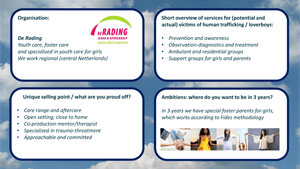
Last month I took part in a European knowledge exchange organised by Nederlands Jeugdinstituut to share approaches to supporting young women who had been sexually exploited. Wendy Shepherd (Barnardo's), Angela Harris (St Christopher's Fellowship) and I were the UK participants at an expert meeting involving service providers from Belgium (where CSE is referred to as Teen Pimps) and from the Netherlands (where the phenomenon is called Loverboys).
It was a fascinating two days that included a visit to FIDES a residential home specifically for exploited girls. It was a 'home' - with the completely domestic feel that few children's homes achieve - but what was abundantly clear was that it is at the same time a therapy centre providing both a therapeutic environment and individual treatment. 80-90% of the girls screen positive for complex trauma and there's a full time psychotherapist on the staff providing therapy (including EMDR). Therapy is 'normalised' at FIDES and the girls are actively involved in developing their own plans for treatment. In addition each girl has a mentor (key worker) who works closely with the therapist to ensure therapy is reinforced in everyday conversations and experiences. There's also a group work programme to build self-confidence and resilience so the girls come to believe they are worth more than to be abused and prostituted. Crucially, FIDES recruit and support an attachment figure for each girl - preferably but not always a parent. They work hard to engage parents, undertake psycho-educational work with them and support them to provide a 'secure base' for their daughter into the future. If at any time a girl has to be transferred to a secure unit because the risks are too high in the community it is for as short a time as possible, after which they return to FIDES. They thus provide the kind of continuity that is so rare in the care experiences of exploited young people in the UK. As yet they have no systematic follow up of the young women so there is no complete picture of outcomes, but many girls stay in touch and as FIDES was celebrating its 10th birthday during our visit we had the pleasure of meeting some who had returned for the party.
I was hugely impressed with two things in particular about FIDES. First, the commitment to parallel working with parents - or supporting the development of an alternative long-term attachment relationship if that wasn't possible. Second, the integration of individual therapy with the whole package of care - rather than young people being sent off for mental health appointments in the hope all the nasty, dirty trauma can be dealt with by somebody else, somewhere else. Together these ensure a truly holistic response to the impact of sexual exploitation on young lives.
At the expert meeting the following day what impressed me most was not the work of any particular service but hearing about the strategic work of the Jeugdinstituut in collaborating with a range of service providers to generate detailed descriptions of interventions in order that future impact evaluation would be possible. With the institute's support 10 providers had produced comprehensive handbooks for practitioners describing their client group, theoretical base and models of intervention. This had involved considerable work by practitioners (on top of their day jobs) but the pay-off from the process was the 'fine tuning' and improvement in their offers as well as laying the essential foundations for future assessment of effectiveness.
There was an interesting discussion of the different terminology we used in the three countries - Loverboys, Teen Pimps and CSE. We talked about the histories and politics of how we define, and what we label, this form of abuse - and how that interacts with policy and practice in the field. However, what was abundantly clear was that the young women we were concerned with were all suffering the same abuse, with the same destructive consequences and that there was a lot we could learn from each other about what might be done about it.
<< Back to Blogs